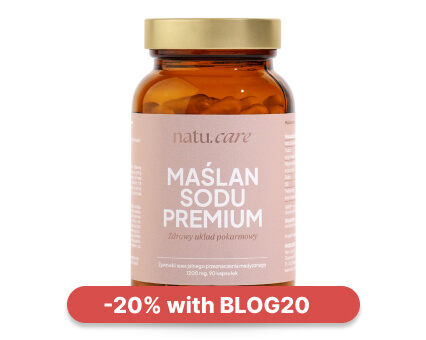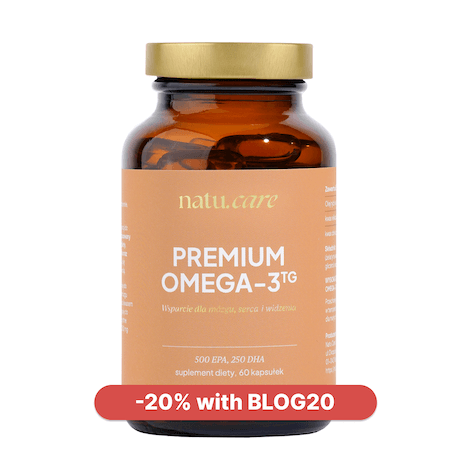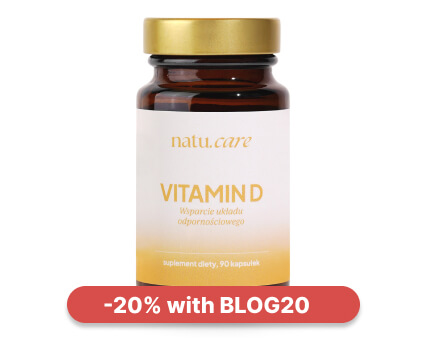Potassium in the body - deficiency, symptoms, standard, what it's in
Potassium is one of the essential minerals that affects many processes in the body.


Learn more about our editorial process
.

Learn more about our editorial process
.

Learn more about our editorial process
.

Learn more about our editorial process
.
Why you can trust us
Articles on Natu.Care are written based on scientific research, data from government websites and other reliable sources. The texts are written in cooperation with doctors, nutritionists and other health and beauty experts. Articles are reviewed before publication and during significant updates.
.Learn more about our editorial process
.Information about advertisements
Content on Natu.Care may contain links to products from the sale of which we may receive a commission. When creating content, we adhere to high editorial standards and take care to be objective about the products discussed. The presence of affiliate links is not dictated by our partners, and we select the products we review ourselves completely independently.
.Learn more about our terms and Conditions
.Potassium is a very hard-working element in our body. As you read this article, it is transmitting electrical impulses between cells, 'wrestling' with sodium to lower blood pressure and 'working' with magnesium to keep an eye on hydration levels.
In this article, you will learn about the important functions of potassium and why its correct concentration is so important for our health. Together with nutritionist Aleksandra Cudna, we will treat you to potassium-rich recipes and share some interesting facts about this element.
From this article you will learn:
.- What potassium is and what properties it has .
- What are the causes, symptoms and treatment of potassium deficiency .
- When do we talk about excess potassium and what effects does this have .
- What are the best sources of potassium in the diet .
- What interesting high-potassium meals you can incorporate into your diet .

Sprawdź, co połączenie magnezu i witaminy B6 może zrobić dla Twojego zdrowia!
Natu.Care Magnez Premium + Witamina B6
Wesprzyj prawidłowe funkcjonowanie układu nerwowego, krwionośnego i mięśniowego dzięki synergicznemu działaniu magnezu i witaminy B6. Odkryj pełnię korzyści dla Twojego zdrowia każdego dnia!
Sprawdź cenę
Magnez Premium przyjmuję już od 2 miesięcy i naprawdę czuję się znacznie lepiej. Mam więcej energii, przestałam mieć skurcze i nie denerwuję się już tak szybko, co w przypadku bycia mamą – bywa wyzwaniem!@DianaW.
See also:
Potassium properties and role in the body
.
Potassium - along with magnesium, calcium and sodium - is an important electrolyte present in our body. Thanks to the potential difference it creates between the inside of the cell and the external environment, it conducts electrical charges that activate various functions of our cells and nervesand.
About 98% of potassium in the body is found inside cells. Of this, 80% is found in skeletal muscle and 20% in bones, red blood cells and liver. Total body potassium content depends on gender, age, muscle mass (which contains 60-75% of total body potassium) and is approximately 40-45, and 50-55 mmol per kilogram of body weight for adult women and men, respectivelyand.
.
The average adult weighing 60 kg has about 120 g of potassium in their body. That's as much as a medium-sized banana weighs!
Potassium is responsible forand:
- proper water and electrolyte balance, .
- regulation of the body's acid-base balance, .
- maintaining the correct electrical tension on cell membranes, .
- transmission of electrical impulses between cells, .
- lowering blood pressure, .
- activation of many body enzymes, .
- participation in the metabolism of nutrients (carbohydrates, proteins), .
- control of muscle function, .
- regulation of water levels in the body, .
What does potassium help with? Normal potassium levelsand:
- protects against stroke, .
- reduces loss of calcium excreted in urine, .
- regulates normal heartbeat, .
- may have a protective effect on bone mineral density, .
- may protect bones against the development of osteoporosis, .
- may reduce the risk of kidney stones, .
Potassium deficiency - symptoms
.
Hypokalaemia is otherwise known as potassium deficiency. It occurs when the serum potassium concentration is below 3.5 mmol/l. The symptoms of hypokalaemia vary depending on how severe the deficiency is.and
A temporary drop in potassium concentration may not cause any symptoms. If you have a session of intense training behind you where you sweated a lot, your potassium concentration may normalise after eating a meal or drinking electrolytes .
However, a long-term deficit is bound to manifest itself with different signals sent by your body. If serum potassium concentrations are chronically low, this can result in serious consequences for health.
Symptoms of potassium deficiency includeand:
- fatigue, weakness, .
- muscle spasms,
- paresthesias - muscle spasms,
- pain, weakness,
- paresthesias - tingling and numbness in the limbs,
- discomfort.
- constipation, abdominal bloating, .
- arrhythmia (uneven heartbeat), .
- breathing problems - shortness of breath, .
- increased blood pressure, .
- pain.
Do you notice these symptoms in yourself? Make an appointment for a consultation or blood test.
Causes of potassium deficiency
.
Although potassium is an element available in many foods, there are some factors that increase the risk of potassium deficiency. Read the list below and if you notice some of these apply to you or a loved one - pay attention to the correct supply of potassium in the dietand.
Potassium deficiency - causes :
.- vomiting, diarrhoea, .
- little nutritional diet, eating disorders (anorexia, bulimia), .
- frequent physical exercise, active sports, .
- increased sweating (e.g. exercise, fever), .
- kidney diseases, .
- use of diuretics or consumption of similarly acting liquids (e.g. coffee, black tea, herbs), .
- use of certain antibiotics (e.g. penicillin), .
- abuse of alcohol, .
- Conn's syndrome (excessive secretion of the hormone aldosterone), .
- magnesium deficiency, .
- chronic stress, .
Do you know why stress is said to leach potassium? Chronic stress leads to an increase in the concentration of aldosterone in the blood. Excess aldosterone causes increased excretion of potassium in the urine..
 .
.
Alexandra Cudna Clinical nutritionist
.
Potassium deficiency - diagnosis
.
If you suspect you have a potassium deficiency, you can ask your GP to refer you for a serum potassium level test. This is part of a test that assesses the concentration of all electrolytes present in the plasma, the ionogram.
You can also have the test done privately - prices start at around £15. The test should be carried out on an empty stomach (about 12 hours between meals), and 2-3 days before the test it is advisable to limit alcohol consumption and avoid strenuous physical activityand.
The normal plasma concentrations of ionograms, or ionograms, are the same as those of other blood tests.
The normal serum potassium concentration is 3.5-5.0 mmol/l. Supplementation is indicated when its serum concentration is < 3.5 mmol/l .
What leaches potassium?
.
Potassium is flushed out of the bloodstream due to perspiration, use of diuretic drugs and drinks (e.g. coffee, black tea, herbal teas), due to diarrhoea, vomiting, exercise, chronic stress, excessive dietary salt intake and folic acid (vitamin B9) deficiency) .
Treatment of potassium deficiency
.
In treating potassium deficiency, the cause of the condition must first be addressed. This may require an analysis of medications taken, lifestyle, physical activity or diet. For a low deficiency, increasing the amount of potassium in the diet is usually sufficient. If this does not help, your doctor may recommend supplementation with well-absorbed potassium or the inclusion of potassium-containing medicationand.
Severe hypokalaemia requires parenteral potassium supply, with concomitant monitoring of serum potassium levels. Fortunately, these are not common casesand.
.
Natu.Care Collagen Premium 5000 mg, mango & passion fruit

- Collagen content: 5000 mg marine collagen hydrolysate
- Additional active ingredients: vitamin C, low molecular weight hyaluronic acid (and L-theanine and coenzyme Q10 in cocoa flavoured collagen or vitamin A and vitamin E in mango–passion fruit flavoured collagen)
- Form: powder sachets
- Dose: 1 sachet per day
- Sufficient for: 30 days
Product description
Fish collagen from the Natu.Care brand in a dose of 5000 mg, based on certified ingredients of the best quality. Regular supplementation will positively influence the appearance of the skinóry, hairów and nails – they will be rebuilt and strengthened from the inside.
In addition to collagen, which is valuable for health and beauty, it also offers other active ingredients that help to maintain a youthful complexion, shiny hair and strong nails.
The formula contains a sufficient portion of the active ingredient to positively affect joints, the musculoskeletal system and immunity.
Natu.Care Premium Collagen is available in two flavours – Cacao Bloom and Rise&Shine. Both formulas are based on the following active ingredients: marine collagen hydrolysate, wild roseóbud extract and hyaluronic acid.
Additionally, Cacao Bloom contains natural L-theanine, coenzyme Q10 and defatted Dutch cacao. Rise&Shine instead contains vitamin E and vitamin A.
These are the best collagens in the world.
These best fish collagens on the market also rós taste – Cacao Bloom is a treat for chocolate lovers. Rise&Shine will appeal to those whoólike the refreshing taste of mangoófruit and passion fruit.
Pros and cons
Pros:
- Vitamin C supports the body's collagen production, enhancing its effectiveness.
- An effective dose of hyaluronic acid, which additionally supports skin hydration and joint health.
- Fish collagen absorbs 50% better. Additionally, the manufacturer specifies the fish species it is sourced from (Atlantic cod).
- The composition has been tested by the independent and accredited J.S. Hamilton laboratory.
- MSC (Marine Stewardship Council) quality certification, which confirms that the collagen source supports sustainable fishing practices.
Cons:
- None.
Additional information
Natu.Care's fish collagen receives praise for its delicious taste. You won't find the fishy aftertaste that often comes through in other collagens. Plus, you have two tasty flavors to choose from: cocoa and mango-passionfruit.
Active ingredients like coenzyme Q10, hyaluronic acid, and natural L-theanine provide anti-inflammatory and antioxidant benefits while slowing down aging processes.
User review
Super, after about 6 weeks of use, the skin on my face became noticeably firmer. Wonderful taste.
Ania ZalewskaNatu.Care customer
Natu.Care Premium collagen 10 000 mg, mango-maracuja
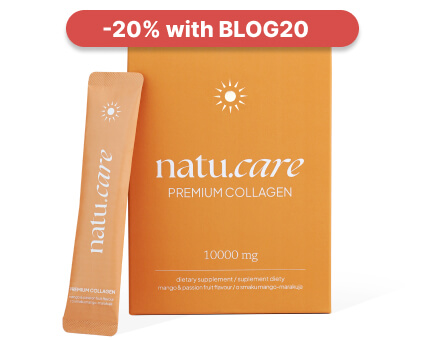
- Collagen content: 10,000 mg marine collagen hydrolysate
- Additional active ingredients: vitamin C, low molecular weight hyaluronic acid (and L-theanine and coenzyme Q10 in cocoa flavoured collagen or vitamin A and vitamin E in mango–passion fruit flavoured collagen)
- Form: powder sachets
- Dose: 1 sachet per day
- Sufficient for: 30 days
Product description
One of the strongest collagens on the market, whichós provides as much as 10,000 mg in a daily serving. This allows the formula to effectively support the condition of the skin, hair and nails.
With this supplement, you will support your beauty, which will allow you to visually stop the ageing process and feel a second youth!
Natu.Care Collagen Premium 10 000 mg comes in two flavours – cherry and mango-maracuja. Both formulas have the same product backbone – collagen, hyaluronic acid and vitamin C.
In the cherry version you additionally find glucosamine, chondroitin and Indian frankincense resin extract. Mango-maracuja, on the other hand, contains vitamin E and vitamin A.
Pros and cons
Pros:
- Tested collagen formula – SeaGarden, whose effects have been confirmed in clinical studies.
- Effective dose of hyaluronic acid, additionally moisturizing the skin and positively impacting joint health.
- Vitamin C supports the body’s natural collagen production.
- The composition has been tested by the independent and accredited J.S. Hamilton laboratory.
- The product has an MSC (Marine Stewardship Council) quality certification – the collagen source supports sustainable fishing practices.
Cons:
- None.
Additional information
Users praise Natu.Care Collagen Premium for the easy dissolvability of the powder.
User review
I noticed a significant improvement in my skin texture after a few weeks of taking collagen regularly. My complexion is now as soft as velvet!
Natu.Care Collagen Premium 10000 mg, cherry

- Collagen content: 10,000 mg of hydrolyzed bovine collagen
- Additional active ingredients: vitamin C, low molecular weight hyaluronic acid, glucosamine, chondroitin, extract of Indian frankincense resin (boswellia serrata)
- Form: powder sachets for drinking
- Serving: 1 sachet per day
- Lasts for: 30 days
Product description
One of the strongest collagens on the market, providing as much as 10,000 mg per daily serving. This product can effectively support the condition of joints, skin, hair, and nails.
With this supplement, you will support your skeletal and joint system as well as your beauty, helping you visually halt the aging process and feel rejuvenated!
Pros and cons
Pros:
- The daily portion of collagen is very large – as much as 10,000 mg.
- Proven collagen formula – COLLinstant, whose effectiveness has been confirmed in clinical studies.
- Effective dose of hyaluronic acid, which additionally moisturizes the skin and positively affects joint health.
- Vitamin C supports the body's natural collagen production.
- Glucosamine is a fundamental building block of compounds found in joint cartilage and a component of collagen that gives elasticity to connective tissue in tendons.
- Chondroitin is a natural component found in the human body, mainly in cartilage. This large molecule (mucopolysaccharide) has the ability to absorb water, which helps maintain the elasticity and resilience of cartilage.
- Frankincense resin extract supports blood circulation and joint mobility and reduces their stiffness. It may help alleviate inflammatory conditions.
- The composition has been tested by the independent and accredited J.S. Hamilton laboratory.
Cons:
- None.
Additional information
Users praise Natu.Care Collagen Premium for the easy dissolving of the powder.
Premium Sodium Butyrate
Product description
Premium Sodium Butyrate is a natural support for your digestive system. With a high dose of butyric acid (940 mg), it supports the regeneration of the intestinal mucosa, improving gut health and function, and aids in the absorption of nutrients. By taking care of your intestines, you're taking care of the health of your entire body.
Studies involving people suffering from irritable bowel syndrome confirm that sodium butyrate is ideal for supporting issues related to bacterial flora imbalances (for example, after antibiotic therapy), constipation and diarrhea, inflammation of the intestinal mucosa, or a diet low in fiber.
Premium Sodium Butyrate capsules are made using the innovative DRcaps® technology. This guarantees that the active ingredients in the product are protected from the destructive effects of stomach acids and digestive enzymes. As a result, we can be sure that the beneficial ingredients are released in the small intestine and are fully absorbed by our body.
Premium Sodium Butyrate from Natu Care is 100% tested, and its composition contains only the highest quality raw materials.
Pros and cons
Pros:
- Supports digestive system function
- Helpful for various gastrointestinal conditions, including IBS
- High dose of butyric acid in each capsule
- Eco-friendly, clean, and tested composition
- Free from added sugar, gluten, GMOs, and lactose
- Innovative capsule technology - DRcaps
Cons:
- None
Additional Information
Take 3 capsules daily at any time of the day, preferably with a meal. Swallow the capsules whole with water.
Premium Sodium Butyrate is intended for adults.
The product should be used under medical supervision.
User review
I've been using the product for 2 weeks. My stomach feels lighter, and my digestion has improved. I recommend it.
Natu.Care Premium Magnesium + Vitamin B6
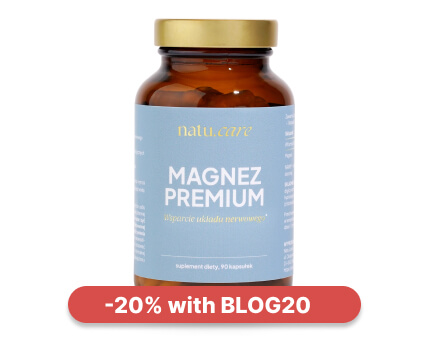
- Magnesium content per day: 305 mg
- Additional active ingredients: Vitamin B6 (2.1 mg)
- Form: capsules
- Serving size: 3 capsules per day
- Sufficient for: 30 days
Product description
The Premium Magnesium + Vitamin B6 dietary supplement is a comprehensive product that combines three organic forms of magnesium (citrate, malate, and diglycinate) and vitamin B6 in highly absorbable forms.
Magnesium is an essential mineral without which our bodies cannot function properly. It supports the immune, nervous, and muscular systems, maintains electrolyte balance, and is involved in cell division and the regulation of mental functions.
Research shows that magnesium supplementation is even more effective when accompanied by vitamin B6, which is included in our product. Vitamin B6 is responsible for the proper functioning of the nervous and immune systems, as well as the proper functioning of the heart.
If you want to safely get rid of feelings of fatigue, concentration problems, hair loss, muscle cramps, trembling, or irritability, reach for Premium Magnesium from Natu.Care, tested by the independent, certified laboratory J.S. Hamilton Poland.
Pros and cons
Pros
- Supports the proper functioning of the nervous and immune systems.
- Reduces feelings of fatigue and tiredness.
- Maintains proper psychological functions.
- The purity of the ingredients (free from anti-caking agents, artificial fillers, and additives such as titanium dioxide, microcrystalline cellulose, talc, magnesium stearate, and silicon dioxide) has been confirmed by laboratory tests.
- High absorption of ingredients.
- Soft capsules that are easy to swallow.
- Suitable for vegetarians and vegans.
Cons
- None.
Additional information
Take with a meal, 3 capsules per day.
The capsules should be taken with at least 250 ml of water.
If you have trouble sleeping, it is advisable to take 1 capsule in the morning and 2 capsules in the evening, no later than 4 hours before bedtime.
Avoid combining with products high in calcium (milk, yogurt, cheese), as this may negatively affect magnesium absorption.
Pregnant and breastfeeding women should consult a doctor before starting supplementation.
User review
I’m very impressed with the speed of delivery. The product itself is of high quality and absorbs well. After two weeks of supplementation, I’ve noticed a significant improvement in muscle recovery, especially during periods of intense training. I highly recommend it!
Product description
The dietary supplement contains omega-3ᵀᴳ, or omega-3 acids in the form of trójglyceridesów. Scientific studies suggest that this form of fatty acidsós up to 2 times better absorbed than the estersós present in many dietary supplements on the market. This means that you are assured of their effectiveness and of supplying yourself with valuable omega acids.
Fatty acids omega-3 are derived from wild anchovy oil. It is a rich source of healthy fats that are essential for the health of the cardiovascular, immune and nervous systems, as well as the proper function of vision, joints muscles.
Scientific research suggests that wild anchovies are a good source of healthy fats.
Scientific research also suggests that an adequate intake of omega-3 fatty acidsós protects against and supports the treatment of depression and anxiety disorders. In addition, omega-3s influence the hydration and appearance of the skinóry and support healthy sleep.
.
The formula contains a total of 750 mg of EPA+DHA acidsós, which is three times higher than the recommended minimum of 250 mg for the Polish population. Omega-3 TG Premium has studies indicating that its TOTOX is 9, which is a very good result.
Supplementation of omega-3 fatty acidsóis recommended for anyone who does not eat 1–2 portions (approximately 300 g) of oily fish per week. Children during growth, seniors, physically active people, vegans and vegetarians, as well as patients undergoing cardiovascular treatment and prevention of heart disease also have an increased need.
Pros and cons
The dietary supplement contains omega-3ᵀᴳ, or omega-3 acids in the form of trójglyceridesów. Scientific studies suggest that this form of fatty acidsós up to 2 times better absorbed than the estersós present in many dietary supplements on the market. This means that you are assured of their effectiveness and of supplying yourself with valuable omega acids.
Fatty acids omega-3 are derived from wild anchovy oil. It is a rich source of healthy fats that are essential for the health of the cardiovascular, immune and nervous systems, as well as the proper function of vision, joints muscles.
Scientific research suggests that wild anchovies are a good source of healthy fats.
Scientific research also suggests that an adequate intake of omega-3 fatty acidsós protects against and supports the treatment of depression and anxiety disorders. In addition, omega-3s influence the hydration and appearance of the skinóry and support healthy sleep.
.
The formula contains a total of 750 mg of EPA+DHA acidsós, which is three times higher than the recommended minimum of 250 mg for the Polish population. Omega-3 TG Premium has studies indicating that its TOTOX is 9, which is a very good result.
Supplementation of omega-3 fatty acidsóis recommended for anyone who does not eat 1–2 portions (approximately 300 g) of oily fish per week. Children during growth, seniors, physically active people, vegans and vegetarians, as well as patients undergoing cardiovascular treatment and prevention of heart disease also have an increased need.
Additional information
The dietary supplement contains omega-3ᵀᴳ, or omega-3 acids in the form of trójglyceridesów. Scientific studies suggest that this form of fatty acidsós up to 2 times better absorbed than the estersós present in many dietary supplements on the market. This means that you are assured of their effectiveness and of supplying yourself with valuable omega acids.
Fatty acids omega-3 are derived from wild anchovy oil. It is a rich source of healthy fats that are essential for the health of the cardiovascular, immune and nervous systems, as well as the proper function of vision, joints muscles.
Scientific research suggests that wild anchovies are a good source of healthy fats.
Scientific research also suggests that an adequate intake of omega-3 fatty acidsós protects against and supports the treatment of depression and anxiety disorders. In addition, omega-3s influence the hydration and appearance of the skinóry and support healthy sleep.
.
The formula contains a total of 750 mg of EPA+DHA acidsós, which is three times higher than the recommended minimum of 250 mg for the Polish population. Omega-3 TG Premium has studies indicating that its TOTOX is 9, which is a very good result.
Supplementation of omega-3 fatty acidsóis recommended for anyone who does not eat 1–2 portions (approximately 300 g) of oily fish per week. Children during growth, seniors, physically active people, vegans and vegetarians, as well as patients undergoing cardiovascular treatment and prevention of heart disease also have an increased need.
Expert opinion
The dietary supplement contains omega-3ᵀᴳ, or omega-3 acids in the form of trójglyceridesów. Scientific studies suggest that this form of fatty acidsós up to 2 times better absorbed than the estersós present in many dietary supplements on the market. This means that you are assured of their effectiveness and of supplying yourself with valuable omega acids.
Fatty acids omega-3 are derived from wild anchovy oil. It is a rich source of healthy fats that are essential for the health of the cardiovascular, immune and nervous systems, as well as the proper function of vision, joints muscles.
Scientific research suggests that wild anchovies are a good source of healthy fats.
Scientific research also suggests that an adequate intake of omega-3 fatty acidsós protects against and supports the treatment of depression and anxiety disorders. In addition, omega-3s influence the hydration and appearance of the skinóry and support healthy sleep.
.
The formula contains a total of 750 mg of EPA+DHA acidsós, which is three times higher than the recommended minimum of 250 mg for the Polish population. Omega-3 TG Premium has studies indicating that its TOTOX is 9, which is a very good result.
Supplementation of omega-3 fatty acidsóis recommended for anyone who does not eat 1–2 portions (approximately 300 g) of oily fish per week. Children during growth, seniors, physically active people, vegans and vegetarians, as well as patients undergoing cardiovascular treatment and prevention of heart disease also have an increased need.
Natu.Care Vitamin D 2000 UI
Product description
Vitamin D plays a crucial role in our health and well-being. It affects calcium and phosphate metabolism, which translates to healthy bones and teeth. It also helps regulate the immune system, and studies indicate its influence on the functioning of the nervous system.
Vitamin D, although called a “vitamin,” is actually a prohormone that our body produces on its own, primarily under the influence of sunlight. Unfortunately, our modern lifestyle contributes to deficiencies of this essential vitamin. Working in enclosed office buildings, using (necessary!) SPF creams, and covering the body with clothing all make it very difficult, if not impossible, to obtain adequate levels of vitamin D from sunlight. This is why appropriate, year-round supplementation is so crucial.
Vitamin D from Natu.Care is a well-tested vitamin D3 suspended in safflower oil, a plant known for its numerous health benefits. The convenient, easy-to-swallow capsule will make supplementation a part of your daily, healthy routine, improving your overall well-being.
Pros and cons
Pros:
- Ensures proper functioning of the immune system
- Supports the maintenance of healthy bones and teeth
- Maintains proper heart, kidney, and muscle function
- Tested by an independent, certified laboratory
- Convenient and easy-to-swallow capsule
- Clean composition - free from added sugar, gluten, GMOs, lactose, and without preservatives or colorants
Cons:
- None.
Additional Information
Pregnant women and breastfeeding mothers should consult a doctor before using the product. This dietary supplement is intended for a healthy adult population up to the age of 75.
Collagen Booster - Glow Stories
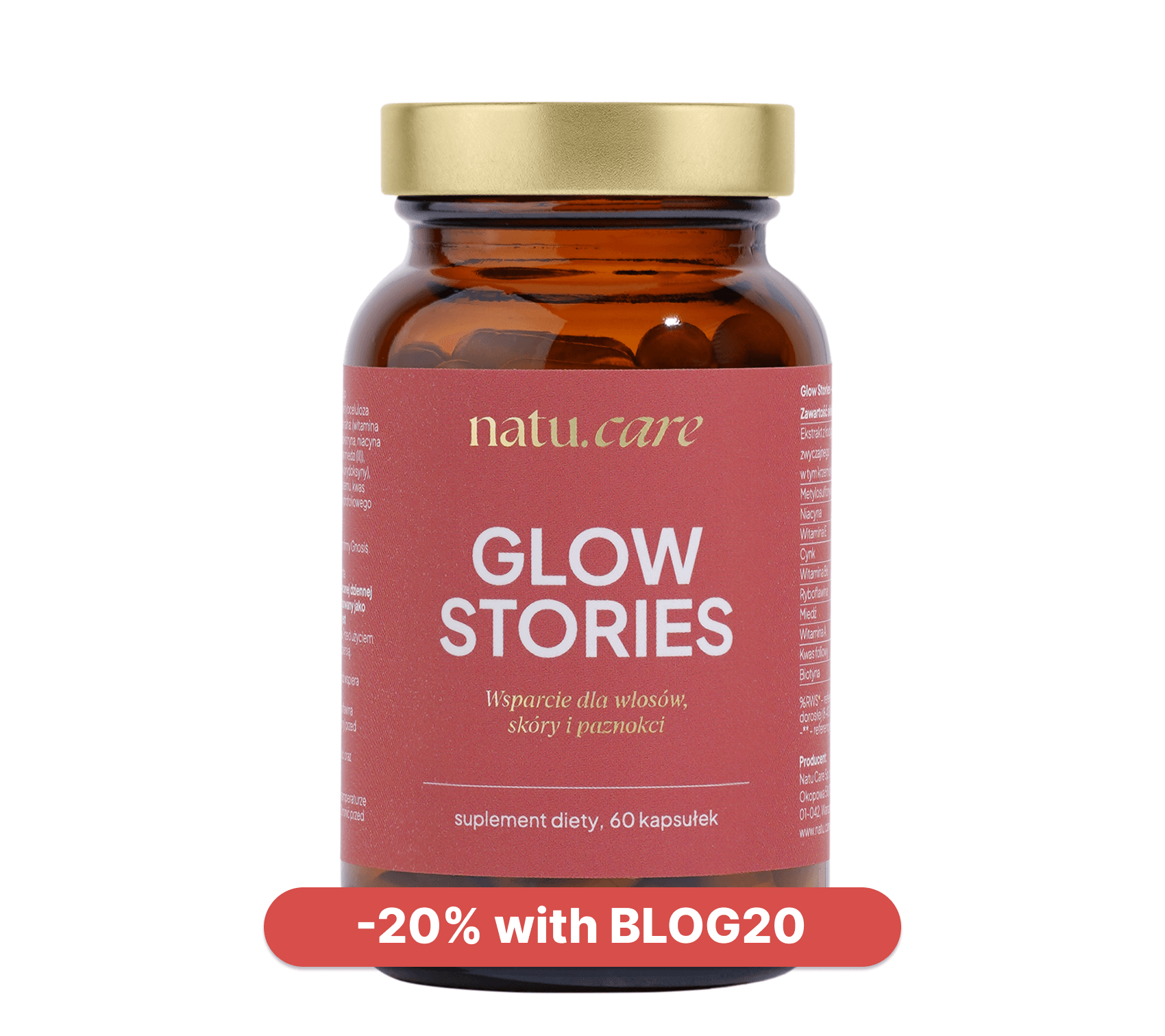
- Active ingredients: bamboo shoot extract, Quatrefolic®, L-Methionine, L-cysteine, vitamin E, vitamin A, niacin (vitamin B3), vitamin B6, vitamin B2 (riboflavin), biotin, zinc, copper
- .
- Form: capsules
- .
- Dose: 1 capsule per day
- .
- Sufficient for: 60 days
- .
Product description
A dietary supplement containing vitamins, minerals and plant extracts thatósupport the skinóhand, hair and nails. The product is especially distinguished by the form of folate – it is Quatrefolic, whichós absorbed very well and is natural.
In addition to valuable vitamins and minerals, such as vitamin A, E, B3, B2 and biotin, the formula contains bamboo shoot extract, whichóry further enhances your beauty.
Pros and cons
A dietary supplement containing vitamins, minerals and plant extracts thatósupport the skinóhand, hair and nails. The product is especially distinguished by the form of folate – it is Quatrefolic, whichós absorbed very well and is natural.
In addition to valuable vitamins and minerals, such as vitamin A, E, B3, B2 and biotin, the formula contains bamboo shoot extract, whichóry further enhances your beauty.
Additional information
A dietary supplement containing vitamins, minerals and plant extracts thatósupport the skinóhand, hair and nails. The product is especially distinguished by the form of folate – it is Quatrefolic, whichós absorbed very well and is natural.
In addition to valuable vitamins and minerals, such as vitamin A, E, B3, B2 and biotin, the formula contains bamboo shoot extract, whichóry further enhances your beauty.
Excess potassium - symptoms
.
Too much potassium in the body is called hyperkalaemia. It is diagnosed when the serum potassium concentration is above 5.5 mmol/lUand.
In healthy individuals, excess potassium is excreted by the kidneys. However, there are some factors that promote the maintenance of excess of this element in the body.
Causes of excess potassiumand:
- overuse of potassium supplements, .
- kidney disease, .
- taking medication that retains potassium in the body, .
- taking certain chemotherapy drugs, .
- high-potassium diet (more than 4,700 mg of potassium per day), .
- use of potassium-based salt substitutes. .
People with mild hyperkalaemia often have no symptoms or experience symptoms that are not clear-cut (they sometimes signify other conditions). Symptoms may appear gradually over weeks or months.
Symptoms of excess potassiumand:
- muscle weakness, .
- general feeling of weakness or fatigue, .
- nausea and vomiting, .
- muscular pain or cramps,
- difficulty in breathing,
- difficulty in breathing.
- difficulty breathing,
- difficulty in breathing.
- unsteady heartbeat (heart palpitations),
- difficulty in breathing,
- difficulty in breathing.
- pain in the chest, .
Excess potassium should be treated under medical supervision. A low-potassium diet can support the treatment. Such a diet involves reducing or eliminating potassium-rich foods. Boiling of products is the basis of thermal treatment, and frying in fat is avoided. Adequate hydration, elimination of processed food from the menu and reduction of sodium in the diet are important..
 .
.
Alexandra Cudna Clinical nutritionist
.
What is potassium in?
.
I have asked among friends and family where they think the most potassium is in food. The most common answer I heard was in bananas and potatoes. I was not surprised. Instead, the respondents were surprised to find that their favourites ranked quite low in the ranking of potassium sources! Check out the top sources of potassium belowand.
What's the most potassium in?
. .
|
Product . |
Content in 100 g . |
|
Dry soya |
2100 mg |
|
cacao |
1532 mg |
|
dry beans |
1200 mg |
|
dried apricots |
1160 mg |
|
pistachium |
1020 mg |
|
dry lentil |
870 mg |
|
pumpkin seeds |
809 mg |
|
dried plums |
732 mg |
|
Bitter chocolate over 70% |
714 mg |
|
dried dates |
696 mg |
|
coconut squirts |
660 mg |
|
fresh spinach |
558 mg |
|
avocado |
507 mg |
|
potatoes . |
413 mg |
|
Atlantic cod |
413 mg |
|
Atlantic salmon |
363 mg |
|
bananas |
358 mg |
|
cabs |
352 mg |
|
baths |
337 mg |
|
tomatoes |
277 mg |
|
coconut milk |
263 mg |
|
2% fat milk |
159 mg |
Do you have these products in your diet?
.
Potassium rich recipes - from a nutritionist
.
The following potassium-rich meal suggestions from nutritionist Aleksandra Cudna. Prepare yourself a delicious breakfast or serve dinner for two.
Potassium-rich meals.
Cocoa oatmeal
.
Ingredients:
- walnuts - 1 tbsp (10g), .
- banana - 1 piece (90 g), .
- cacao 16%, powder - 1 teaspoon (5 g), .
- food milk, 2% fat or vegetable drink - 1 glass (250 ml), .
- morels, dried - 3 pieces (30 g), .
- Oatmeal - 4 tbsp (40 g), .
Cook the oatmeal in the milk/vegetable drink until thick. Finally add the cocoa, mix. Chop the nuts and apricots, slice the banana. Transfer the oatmeal to a bowl, garnish with banana slices, dried apricots and nuts.
.
This meal has as much as 1384.65 mg of potassium and is high in B vitamins and vitamins A, C, E and K.
Learn how important the correct concentration of these vitamins is for the body in the articles:
Dinner for two - potato salad with smoked salmon
.
Ingredients:
.- red onion, raw - 1/2 piece (50 g), .
- garlic - 1 clove (5 g), .
- natural yoghurt, 2% fat -1 tbsp (15 g), .
- black pepper - 1 pinch (1 g), .
- cress - 2 handfuls (40 g), .
- white salt - 1 pinch (1 g), .
- potatoes, medium - 4 and 1/3 pieces (400 g), .
- beef, smoked - 2 packages (200 g), .
- dill, fresh - 5 teaspoons (20 g), .
- pickled cucumbers - 2 pieces (120 g), .
Wash and boil the potatoes in their uniforms with salt. Then set aside to cool, peel and dice them. Place in a large bowl. Dice the salmon, onion and pickled cucumbers and chop the dill. Add all the ingredients to the bowl with the potatoes. Sprinkle the salad with rocket. Prepare the dressing - mix natural yoghurt with garlic clove, pepper and salt. Pour over the salad, mix the ingredients and serve.
.
One serving has up to 1365 mg of potassium and contains B vitamins, vitamin D, vitamin C, Omega acids and magnesium and zinc, among others.
Daily potassium requirements
.
European Food Safety Authority (EFSA) and World Health Organisation (WHO) expert groups assume that potassium intake should be at a level that will reduce the risk of diseases associated with potassium deficiency, e.g. stroke, hypertension, ischaemic heart diseaseand.
.
The WHO recommends a daily intake of potassium of :
.
- in adults approximately 3500 mg, .
- in children 1100 mg - 4000 mg (depending on age, height, weight and other environmental factors), .
- in pregnant women approximately 4000 mg, .
- in breastfeeding women approx. 4400 mg,
- in people over 65 years of age 4000 mg, .
Daily potassium requirements are an individual issue and may depend on a number of factors, e.g. age (rapid growth in teenagers increases the need), physical activity (athletes due to the loss of electrolytes during exercise), climate (residents of tropical regions lose more electrolytes during hot weather)and.
Might be of interest to you:
.
Potassium contraindications
.
Potassium contraindications include hyperkalemia, renal disease, heart disease, adrenal insufficiency, hypovolemia with hyponatremia, severe dehydration, gastrointestinal inflammation, and use of potassium-sparing diureticsand.
Important!
.Remember to consult your doctor about potassium supplementation to avoid a negative reaction from your body and to avoid harming yourself.
Can potassium be taken during pregnancy?
.
Pregnant women should exercise extreme caution and consult their doctor about the intake of medications and supplements. The US Food and Drug Administration (FDA) has classified potassium in category C. Category C are drugs that show adverse effects in animals but lack confirmation in humans. In this case, adverse effects include effects on the embryo and its developmentand.
Category C drugs are potentially dangerous to the foetus, so they are only prescribed by a doctor when necessary. If you are pregnant, consult your doctor about potassium supplementation, keeping yourself and your baby safeand.
What is the best potassium?
.
When looking for the best potassium, take note of the followingand:
- .
- Form of potassium. The best absorbed form is potassium chloride. In dietary supplements, potassium is also found in the form of aspartate, citrate, gluconate and potassium bicarbonate.
- Choose a extended-release dietary supplement. The active ingredient is released gradually from the carrier, thus avoiding local, high concentrations of potassium, which can act as a gastric irritant.
- The following is an example.
- Status of medication. When you buy a prescription medicine, you are guaranteed efficacy and assured that the product is well tested. Over-the-counter choices include dietary supplements or combination drugs such as potassium with magnesium. .
Potassium and magnesium - an important duo
.
Products combining these two elements can be purchased in pharmacies. Magnesium and potassium are complementary electrolytes. They work together to normalise the function of many organs and systems in the body, including controlling muscle function and ensuring the body is properly hydratedand.
Magnesium is an important electrolyte.
Magnesium increases the uptake of potassium from the gastrointestinal tract, and a deficiency of potassium has a direct effect on the concentration of magnesium in the body. Deficiencies of these elements often occur together. This is why it is so important to control the concentration of these compoundsand.
Potassium and sodium - how do they interact?
.
Potassium and sodium are closely linked. They play a key role in maintaining physiological balance and both have been linked to the risk of chronic disease, particularly on the cardiovascular sideand.
Potassium and sodium affect our bodies in opposite ways. High sodium intake increases blood pressure, which can lead to heart disease. On the other hand, high potassium intake helps to excrete sodium while lowering blood pressureand.
Our body needs much more potassium than sodium. Unfortunately, in Poland the consumption of salt, a compound mainly consisting of sodium and chlorine, exceeds twice the recommended standards. Meanwhile, research suggests that excessive sodium intake increases the risk of premature death by 20%and.
See also:
.
Summary
.
Potassium in a nutshell... knowledge!
- Potassium - along with magnesium, sodium and calcium - is one of the main electrolytes in our body.
- Potassium is one of the main electrolytes in our body.
- The most important functions of potassium in the body are the transmission of electrical impulses between cells, the coordination of muscle function, the regulation of body hydration, the lowering of blood pressure and participation in the metabolism of nutrients.
- Potassium is a major electrolyte in the body.
- Potassium deficiency is called hypokalaemia, and excess is called hyperkalaemia. .
- Potassium-rich foods include soya, cocoa, dried fruit, beans, lentils, pumpkin seeds, pistachios, spinach, avocado, potato. .
- Before starting potassium supplementation, consult your doctor. When you decide to buy a product with this element, pay attention to the bioavailability - the best choice is potassium chloride.
FAQ
.How to replenish potassium deficiency quickly
.To quickly replenish potassium deficiency, it is necessary to implement products rich in this mineral into the diet or to assist with dietary supplements. The most important thing is systematic supplementation and monitoring of the potassium concentration in the blood so as not to harm yourself. Treatment of the deficiency should take place under the guidance of a doctor.
.What leaches potassium?
.The leaching of potassium from the body is influenced by diuretics and beverages (e.g. coffee, black tea, herbal teas), diarrhoea, vomiting, increased physical exertion, chronic stress, excessive dietary salt intake, deficiency of folic acid.
What are the symptoms of potassium deficiency?
.The most common symptoms of potassium deficiency (hypokalaemia) are: fatigue, weakness,
.Muscle cramps, paresthesias (tingling and numbness in the limbs), constipation, abdominal bloating, arrhythmia (uneven heartbeat), breathing problems - shortness of breath, elevated blood pressure.
Can potassium and magnesium be taken together?
.Yes, potassium and magnesium can be taken together. They show complementary effects on our body. Magnesium also increases the absorption of potassium from the digestive tract. Many products with a combination of magnesium and potassium are available in pharmacies. Remember to read the manufacturer's leaflet before consumption.
.When is the best time to take potassium?
.Potassium is best taken during or up to 30 minutes after a meal, with a drink of water. This minimises the risk of gastric irritation. The time of day does not matter.
Is potassium good for a hangover?
.Yes, potassium is good for a hangover. It is best to take potassium for a hangover along with other vitamins, electrolytes and minerals that alcohol has flushed out. Remember that consuming large amounts of alcohol adversely affects water and electrolyte balance.
Does potassium lower blood pressure?
.Yes, potassium lowers blood pressure. If you are taking medication to lower your blood pressure, consult your doctor before starting potassium supplementation.
What are the side effects of taking potassium?
.Side effects of potassium intake are most common in people who use excessive supplementation, take drugs that interact with potassium or have a medical condition (e.g. stomach). Side effects may include: nausea, vomiting, diarrhoea, abdominal pain, heart rhythm disturbances.
.
Sources
.See all
.Adebamowo, S. N., Spiegelman, D., Willett, W. C., & Rexrode, K. M. (2015). Association between intakes of magnesium, potassium, and calcium and risk of stroke: 2 cohorts of US women and updated meta-analyses2, 3. The American Journal of Clinical Nutrition, 101(6), 1269-1277. https://doi.org/10.3945/ajcn.114.100354
Ascherio, A., Rimm, E. B., Hernán, M. A., Giovannucci, E. L., Kawachi, I., Stampfer, M. J., & Willett, W. C. (1998). Intake of Potassium, Magnesium, Calcium, and Fiber and Risk of Stroke Among US Men. Circulation, 98(12), 1198–1204. https://doi.org/10.1161/01.CIR.98.12.1198
Ben-Ishay, D., & Engelman, K. (1973). Bioavailability of potassium from a slow-release tablet. Clinical Pharmacology & Therapeutics, 14(2), 250-258. https://doi.org/10.1002/cpt1973142250
Castro, D., & Sharma, S. (2022). Hypokalemia. In StatPearls. StatPearls Publishing. http://www.ncbi.nlm.nih.gov/books/NBK482465/
.Dietary reference values for potassium | EFSA. (2016, October 25). https://www.efsa.europa.eu/en/efsajournal/pub/4592
Greene, L. W., Webb, K. E., Jr., & Fontenot, J. P. (1983). Effect of Potassium Level on Site of Absorption of Magnesium and Other Macroelements in Sheep. Journal of Animal Science, 56(5), 1214-1221. https://doi.org/10.2527/jas1983.5651214x
Greer, R. C., Marklund, M., Anderson, C. A. M., Cobb, L. K., Dalcin, A. T., Henry, M., & Appel, L. J. (2020). Potassium-Enriched Salt Substitutes as a Means to Lower Blood Pressure. Hypertension, 75(2), 266-274. https://doi.org/10.1161/HYPERTENSIONAHA.119.13241
Gregory, N. S., Kumar, R., Stein, E. M., Alexander, E., Christos, P., Bockman, R. S., & Rodman, J. S. (2015). Potassium Citrate Decreases Bone Resorption in Postmenopausal Women with Osteopenia: A Randomized, Double-Blind Clinical Trial. Endocrine Practice, 21(12), 1380-1386. https://doi.org/10.4158/EP15738.OR
Gumz, M. L., Rabinowitz, L., & Wingo, C. S. (2015). An Integrated View of Potassium Homeostasis. New England Journal of Medicine, 373(1). https://doi.org/10.1056/nejmra1313341
Gyawali, C. P., & Fass, R. (2018). Management of Gastroesophageal Reflux Disease. Gastroenterology, 154(2), 302-318. https://doi.org/10.1053/j.gastro.2017.07.049
He, F. J., & MacGregor, G. A. (2001). Beneficial effects of potassium. BMJ, 323(7311), 497-501. https://doi.org/10.1136/bmj.323.7311.497
He, F. J., & MacGregor, G. A. (2008). Beneficial effects of potassium on human health. Physiologia Plantarum, 133(4), 725-735. https://doi.org/10.1111/j.1399-3054.2007.01033.x
Hoppe, L. K., Muhlack, D. C., Koenig, W., Carr, P. R., Brenner, H., & Schöttker, B. (2018). Association of Abnormal Serum Potassium Levels with Arrhythmias and Cardiovascular Mortality: A Systematic Review and Meta-Analysis of Observational Studies. Cardiovascular Drugs and Therapy, 32(2), 197-212. https://doi.org/10.1007/s10557-018-6783-0
Hypokalemia: Practice Essentials, Pathophysiology, Etiology. (2023). https://emedicine.medscape.com/article/242008-overview
Hypokalemia Treatment & Management: Approach Considerations, Decreasing Potassium Losses, Replenishment of Potassium. (2023). https://emedicine.medscape.com/article/242008-treatment
Kardalas, E., Paschou, S. A., Anagnostis, P., Muscogiuri, G., Siasos, G., & Vryonidou, A. (2018). Hypokalemia: A clinical update. Endocrine Connections, 7(4), R135-R146. https://doi.org/10.1530/EC-18-0109
Kłosiewicz-Latoszek, Prof Dr n med L. (2020, December 8). Excessive consumption of salt, sugar and fat puts health at risk. National Center for Nutrition Education. https://ncez.pzh.gov.pl/abc-zywienia/nadmierne-spozycie-soli-cukru-i-tluszczu-zagraza-zdrowiu/
Krishna, G. G. (1990). Effect of potassium intake on blood pressure. Journal of the American Society of Nephrology: JASN, 1(1), 43-52. https://doi.org/10.1681/ASN.V1143
KULLER, L., FARRIER, N., CAGGIULA, A., BORHANI, N., & DUNKLE, S. (1985). RELATIONSHIP OF DIURETIC THERAPY AND SERUM MAGNESIUM LEVELS AMONG PARTICIPANTS IN THE MULTIPLE RISK FACTOR INTERVENTION TRIAL. American Journal of Epidemiology, 122(6), 1045-1059. https://doi.org/10.1093/oxfordjournals.aje.a114186
.Lanham-New, S. A., Lambert, H., & Frassetto, L. (2012). Potassium. Advances in Nutrition, 3(6), 820-821. https://doi.org/10.3945/an.112.003012
Lehnhardt, A., & Kemper, M. J. (2011). Pathogenesis, diagnosis and management of hyperkalemia. Pediatric Nephrology, 26(3), 377-384. https://doi.org/10.1007/s00467-010-1699-3
Leung, A. M., & Braverman, L. E. (2014). Consequences of excess iodine. Nature Reviews Endocrinology, 10(3), Article 3. https://doi.org/10.1038/nrendo.2013.251
Madan, A., Morris, C., Goggin, A., & Isoardi, K. Z. (2021). Oral potassium overdose: A case series. Clinical Toxicology (Philadelphia, Pa.), 59(11), 963-968. https://doi.org/10.1080/15563650.2021.1898631
.Melikian, A. P., Cheng, L. K., Wright, G. J., Cohen, A., & Bruce, R. E. (1988). Bioavailability of Potassium From Three Dosage Forms: Suspension, Capsule, and Solution. The Journal of Clinical Pharmacology, 28(11), 1046-1050. https://doi.org/10.1002/j.1552-4604.1988.tb03128.x
Mocellin, R., Walterfang, M., & Velakoulis, D. (2007). Hashimoto's encephalopathy: Epidemiology, pathogenesis and management. CNS Drugs, 21(10), 799-811. https://doi.org/10.2165/00023210-200721100-00002
Office of Dietary Supplements-Potassium. (n.d.). Retrieved 17 March 2023, from https://ods.od.nih.gov/factsheets/Potassium-HealthProfessional/
Potassium-rich foods can help offset high salt diet contribution to osteoporosis, UCSF study finds | UC San Francisco. (2002, May 23). https://www.ucsf.edu/news/2002/05/97236/potassium-rich-foods-can-help-offset-high-salt-diet-contribution-osteoporosis
Rodan, A. R. (2017). Potassium: Friend or Foe? Pediatric nephrology (Berlin, Germany), 32(7), 1109-1121. https://doi.org/10.1007/s00467-016-3411-8
Sambu, S., Hemaram, U., Murugan, R., & Alsofi, A. A. (2022). Toxicological and Teratogenic Effect of Various Food Additives: An Updated Review. BioMed Research International, 2022, 6829409. https://doi.org/10.1155/2022/6829409
Santos, H. O., Price, J. C., & Bueno, A. A. (2020). Beyond Fish Oil Supplementation: The Effects of Alternative Plant Sources of Omega-3 Polyunsaturated Fatty Acids upon Lipid Indexes and Cardiometabolic Biomarkers-An Overview. Nutrients, 12(10), Article 10. https://doi.org/10.3390/nu12103159
Scott, J. H., Menouar, M. A., & Dunn, R. J. (2022). Physiology, Aldosterone. In StatPearls. StatPearls Publishing. http://www.ncbi.nlm.nih.gov/books/NBK470339/
Simon, L. V., Hashmi, M. F., & Farrell, M. W. (2022). Hyperkalemia. In StatPearls. StatPearls Publishing. http://www.ncbi.nlm.nih.gov/books/NBK470284/
.Sur, M., & Mohiuddin, S. S. (2022). Potassium. In StatPearls. StatPearls Publishing. http://www.ncbi.nlm.nih.gov/books/NBK539791/
.Tangvoraphonkchai, K., & Davenport, A. (2018). Magnesium and Cardiovascular Disease. Advances in Chronic Kidney Disease, 25(3), 251-260. https://doi.org/10.1053/j.ackd.2018.02.010
Weber, F., & Lehmann-Horn, F. (1993). Hypokalemic Periodic Paralysis. IN M. P. Adam, G. M. Mirzaa, R. A. Pagon, S. E. Wallace, L. J. Bean, K. W. Gripp, & A. Amemiya (Ed.), GeneReviews®. University of Washington, Seattle. http://www.ncbi.nlm.nih.gov/books/NBK1338/
WHO issues new guidance on dietary salt and potassium. (n.d.). Retrieved 17 March 2023, from https://www.who.int/news/item/31-01-2013-who-issues-new-guidance-on-dietary-salt-and-potassium
Zeng, Y., Yang, J., Du, J., Pu, X., Yang, X., Yang, S., & Yang, T. (2014). Strategies of Functional Foods Promote Sleep in Human Being. Current Signal Transduction Therapy, 9(3), 148-155. https://doi.org/10.2174/1574362410666150205165504
Wyszkowski, M., & Radziemska, M. (2009). The effect of chromium content in soil on the concentration of some mineral elements in plants. Fresenius Environmental Bulletin, 18, 1039-1045.
.Abbasi, B., Kimiagar, M., Sadeghniiat, K., Shirazi, M. M., Hedayati, M., & Rashidkhani, B. (2012). The effect of magnesium supplementation on primary insomnia in elderly: A double-blind placebo-controlled clinical trial. Journal of Research in Medical Sciences : The Official Journal of Isfahan University of Medical Sciences, 17(12), 1161-1169.
Ragland, G. (1990). Electrolyte abnormalities in the alcoholic patient. Emergency Medicine Clinics of North America, 8(4), 761-773.
Simşek, M., Naziroğlu, M., Simşek, H., Cay, M., Aksakal, M., & Kumru, S. (1998). Blood plasma levels of lipoperoxides, glutathione peroxidase, beta carotene, vitamin A and E in women with habitual abortion. Cell Biochemistry and Function, 16(4), 227-231.
.Solomon, R. (1987). The relationship between disorders of K+ and Mg+ homeostasis. Seminars in Nephrology, 7(3), 253-262.
Viera, A. J., & Wouk, N. (2015). Potassium Disorders: Hypokalemia and Hyperkalemia. American Family Physician, 92(6), 487-495.
..
Editorials
Meet the team


Editor
Graduate of Journalism and Artes Liberales at the University of Warsaw. Since 2017, he has been working with the biggest portals in Poland and abroad as an editor. Previously worked for 3 years in one of the leading pharmaceutical companies - he knows the health and beauty industry inside out. In his free time, he most enjoys playing tennis or skiing.

Fluoride is an essential mineral for the proper functioning of the body. How does it work and is it harmful? Check!
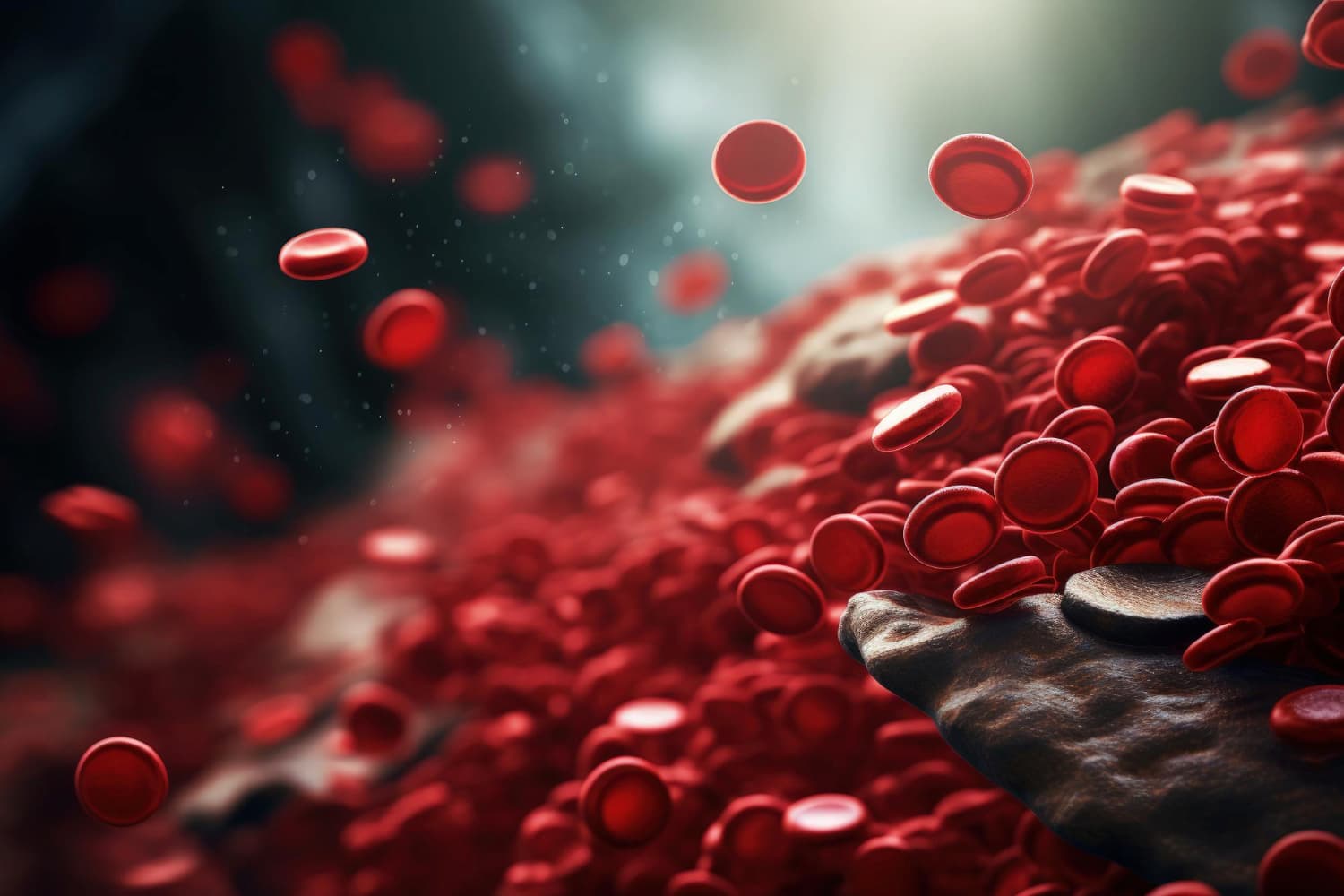
Iron deficiency is a dangerous condition leading to serious neurological and skin symptoms.

Phosphorus is a mineral element that supports bone health, nervous system function and also energy metabolism.
